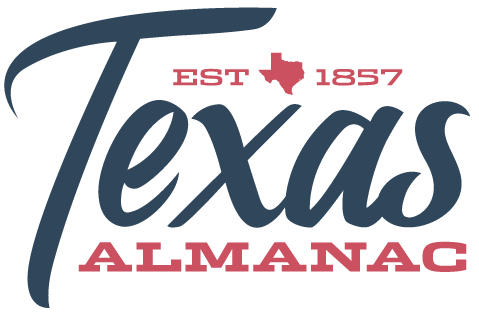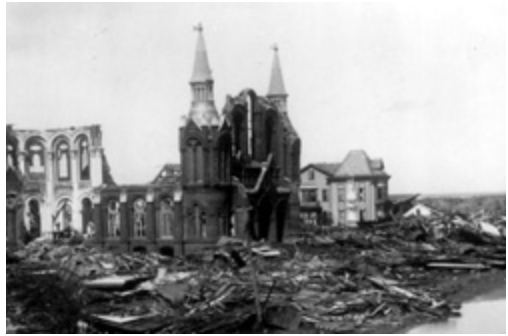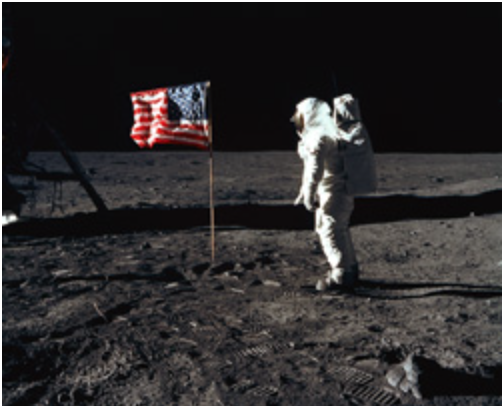1900
Sept. 8 – On the brink of the 20th century, the "Great Hurricane," the greatest natural disaster in human terms ever to strike North America, destroys much of Galveston and kills 6,000 people there.
1901
Jan. 10 – A gusher drilled by mining engineer Capt. A.F. Lucas at Spindletop near Beaumont catapults Texas into the petroleum age.
1902
December – The poll tax becomes a requirement for voting.
1906
July 28 – For the first time, Texans can vote for U.S. senator in the Democratic primary. Although the Legislature retains ultimate appointment authority, primary voters can express their preferences. Not until 1916 are Texas voters able to directly elect U.S. senators.
1910
March 2 – Lt. Benjamin D. Foulois makes the first military air flight in a Wright brothers plane at Fort Sam Houston in San Antonio. The seven-and-a-half-minute flight marks the shaky beginnings of U.S. Air Force.
1911-1920
The Mexican civil war spills across the border, as refugees seek safety, combatants seek each other, and Texas settlements are raided for supplies by all sides in the fighting. Pancho Villa and his followers are active along the border during some of this time.
1917-1918
The United States participates in World War I.
1917
July-September – Gov. James Ferguson is impeached and convicted; he leaves office.
1918
March – Texas women win the right to vote in primary elections.
Nov. 5 – Annie Webb Blanton becomes the first woman elected to a statewide office when she is elected State Superintendent of Public Instruction.
1919
May – Texans adopt a prohibition amendment to the state constitution.
Aug. 7 – Amid anti-German sentiment, Gov. William P. Hobby vetoes appropriations for the German Department of The University of Texas.
1920
Large-scale agricultural irrigation begins in the High Plains.
1923
Legislature passes law expliciting barring blacks from voting in the Democratic primary. Overturned by the U.S. Supreme Court in March 1927, the state Democratic party acted in 1927 and again in 1932 to bar blacks from voting in the primary. The Supreme Court upheld the 1932 action in 1935.
1925
Jan. 20 – Miriam "Ma" Ferguson becomes Texas' first woman governor, serving as a figurehead for her husband, former Gov. James E. Ferguson.
Sept. 30 – Texas Tech University begins classes in Lubbock as Texas Technological College.
1928
June 26-29 – The Democratic National Convention is held in Houston, the first nominating convention held in a Southern city since 1860.
1929
Feb. 17 – The League of United Latin American Citizens (LULAC) is founded in Corpus Christi.
1930
Sept. 5 – The Daisy Bradford #3 well, drilled near Turnertown in Rusk County by wildcatter C.M. (Dad) Joiner, blows in, heralding the discovery of the huge East Texas Oil Field.
1935
August – Two years after federal prohibition was repealed, Texas voters ratify the repeal of the statewide prohibition law, returning localities to their status before the law.
1936
June 6 – The Texas Centennial Exposition opens at Dallas' Fair Park; it runs until Nov. 29.
1937
March 18 – A massive explosion, blamed on a natural-gas leak beneath the London Consolidated School building in Rusk County, kills an estimated 296 students and teachers. Subsequent deaths of people injured in the explosion bring the death count to 311. As a result, the Legislature requires that a malodorant be added to the odorless gas so that leaks can be more easily detected.
1941-1945
The United States participates in World War II.
1943
June 15-16 – A race riot in Beaumont leads to a declaration of martial law. The incident, in which more than 200 were arrested, resulted in the death of two blacks and one white.
1944
April 3 – U.S. Supreme Court rules blacks could not be barred from voting in the Texas Democratic primary.
1947
April 16 – The French-owned SS Grandcamp, carrying ammonium nitrate, explodes in the Texas City harbor, followed the next morning by the explosion of the SS High Flyer. The disaster kills almost 600 and injures at least 4,000 more. The concussion is felt 75 miles away in Port Arthur, and the force creates a 15-foot tidal wave.
1948
August – Lyndon B. Johnson defeats Coke Stevenson by 87 votes for the Democratic nomination to the U.S. Senate in the primary runoff. The winning margin in the disputed vote is registered in Ballot Box No. 13 in Jim Wells County.
1949
Aug. 24 – The University of Texas Medical Branch in Galveston admits its first black student.
1950
June 5 – The U.S. Supreme Court orders racial integration of The University of Texas law school.
1953
Jan. 20 – Dwight D. Eisenhower becomes the first Texas-born President of the United States.
May 11 – A tornado kills 114, injures 597 at Waco; 150 homes and 185 other buildings are destroyed.
May 22 – The Tidelands Bill is signed by President Eisenhower, giving Texas the rights to its offshore oil.
1954
Nov. 2 – Texas voters approve amendments to the state constitution allowing women to serve on juries, and ending the ban on voting by members of the U.S. Armed Forces.
1956
Nov. 6 – Henry B. Gonzalez of San Antonio becomes the first Hispanic elected to the state Senate since 1848 when Jóse Antonio Navarro, a signer of the Texas Declaration of Independence, served.
1958
Sept. 12 – The integrated circuit, developed by Jack Kilby at Texas Instruments, Dallas, is successfully tested, ushering in the semiconductor and electronics age.
1961
May 27 – John Tower wins a special election for U.S. Senate, becoming the first Republican senator from Texas since Reconstruction.
1962
March 1 – NASA opens the Manned Spacecraft Center in Houston. The center moves to a new campus-like building complex in 1964. It is renamed Lyndon B. Johnson Space Center on Aug. 17, 1973.
1963
Nov. 22 – President John F. Kennedy is assassinated in Dallas; vice president Lyndon B. Johnson succeeds to the office, becoming the 36th U.S. president.
1964
Jan. 23 – The poll tax is abolished by the 24th Amendment to the U.S. Constitution as a requirement for voting for federal offices. It is retained in Texas, however, for state and local offices.
1965
May – The Legislature, following a federal court ruling, reapportions legislative districts on the principle of "one man, one vote."
June 3 – San Antonio native Ed White becomes the first American to walk in space.
1966
Aug. 1 – Charles Whitman shoots 46 people from the observation deck of the main-building tower on The University of Texas campus in Austin. The fatalities number 17, including an unborn child at 8 months, Whitman's wife and mother who were killed before he went to the tower, and a victim who spent the rest of his life on kidney dialysis, and whose death in 2001 was ruled a homicide from the incident.
Nov. 8 – The poll tax is repealed as a requirement for voting in all elections by amendment of the Texas Constitution.
Nov. 8 – Barbara Jordan of Houston becomes the first black woman elected to the state Senate.
1967
The Mexican American Legal Defense and Educational Fund (MALDEF) is incorporated in Texas; its first national office is in San Antonio.
1969
July 20 – Apollo 11 astronaut Neil Armstrong transmits the first words from the surface of the moon: "Houston, the Eagle has landed."
1970
November — Federal Judge William Wayne Justice of Tyler orders the Texas Education Agency to assume responsibility for desegregating public schools and to prohibit districts from assigning students to schools on the basis of race.
1971
Jan. 18 – Attorneys at the Securities and Exchange Commission file a lawsuit alleging illegal manipulation of stock transactions involving Frank Sharp and his Sharpstown State Bank of Houston. The Sharpstown Scandal results in the conviction of House speaker Gus Mutscher and two associates for conspiracy and bribery in 1972.
1974
Jan. 8 – A Constitutional Convention meets to attempt to write a new state constitution. However, the delegates, comprising the membership of the 63rd Legislature, become mired in divisive politics, and the convention adjourns on July 30, 1974, without a document.
1978
Nov. 7 – William Clements is elected the first Republican governor of Texas since Reconstruction.
1979
April 10 – Several tornadoes kill 53 in West Texas, including 42 in Wichita Falls, and cause $400 million in damages.
1984
July – The no-pass-no-play rule is part of an education-reform package enacted by the Legislature.
Aug. 20-23 – The National Republican Convention is held in Dallas.
1985
June – The Federal Home Loan Bank Board suspends deposit insurance for Texas savings-and-loan companies applying for state charters. Three years later, after uncovering widespread insider abuse at Texas lending institutions, federal regulators announce bail-out plans for many Texas thrifts and begin prosecution of S&L officials.
1988
Nov. 8 – Houstonian George H.W. Bush is elected president of the United States.
1990
Nov. 6 – Democrat Ann Richards is elected the first woman governor of Texas in her own right.
1993
April 19 – Ending a siege that began on Feb. 28, federal agents storm the compound called Mount Carmel near Waco, where cult leader David Koresh and his followers, called Branch Davidians, had reportedly been storing a large cache of assault weapons. The assault and ensuing fire kill four agents and 86 Branch Davidians.
June 14 – Republican Kay Bailey Hutchison becomes the first woman to serve as U.S. Senator from Texas.
2000
Nov. 7 – Texas Gov. George W. Bush is elected president of the United States.



